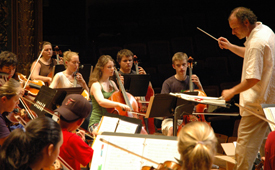Music Review: NEC Festival Youth Orchestra
Reviewed By Caldwell Titcomb

Aaron Kula conducting the NEC Festival Youth Orchestra. Photo: Andrew Hurlbut
The musicians range in age from 13 to 18. They are chosen by audition and meet for 14 six-hour days of coaching and rehearsing culminating in a free, public concert. This year’s roster contained some 75 teenagers plus a few ringers.
The program opened appropriately with Johannes Brahms’s grand “Academic Festival Overture” (1880). This begins softly in C minor but soon proceeds to draw on a series of German student songs ending with the famous “Gaudeamus Igitur” in a majestic C major. There was a bit of ragged rhythm at the outset, but the players quickly settled down. Widespread applause broke out prior to the final three chords—something the conductor could have forestalled by his podium demeanor.
Early publicity announced a performance of Leopold Stokowski’s 1927 transcription of Bach’s celebrated organ piece Toccata and Fugue in D Minor. A change in the program gave us instead the Bacchanale from Camille Saint-Saëns’s opera Samson et Dalila (1877). This well-known piece is rambunctious and employs large forces, including a harp. The orchestra’s rhythmic ensemble was laudable.
There followed this year’s Concerto Competition Winner, the orchestra’s principal viola player, Raymond Dineen, selected from nine candidates. He chose Max Bruch’s Romance for Viola and Orchestra, Op. 85 (1911). This was a welcome rarity, which I had never heard before. Bruch wrote a lot of lovely music and is best known for his marvelous G-minor Violin Concerto. Here he used a somewhat reduced orchestra, which still was allowed to overpower the soloist from time to time.
After intermission came Nicolai Rimsky-Korsakov’s “Scheherazade,” Op. 35 (1888), based on The Arabian Nights. This is a huge symphonic suite in four movements, lasting 45 minutes: “The Sea and Sinbad’s Ship”; “The Story of the Kalendar Prince”; “The Young Prince and Princess”; and “Festival in Baghdad . . .”
Rimsky-Korsakov was one of the greatest orchestrators of all time, and this work is a superb showpiece. The opening motto recurs in several guises, and there ensue many gorgeous melodies. The composer intersperses a lot of solos for the instruments—notably violin (concertmaster Alexander Andonian), harp, bassoon, clarinet, horn, and flute. Conductor Kula called for a good deal of elasticity in tempo, and the players were with him all the way. This colorful performance eventually elicited a four-minute, bongo-inspired encore.
One hopes that this admirable project will return next summer for a 12th go-around.
Tagged: Boston, Caldwell-Titcomb, Classical Music, Jordan Hall, NEC
